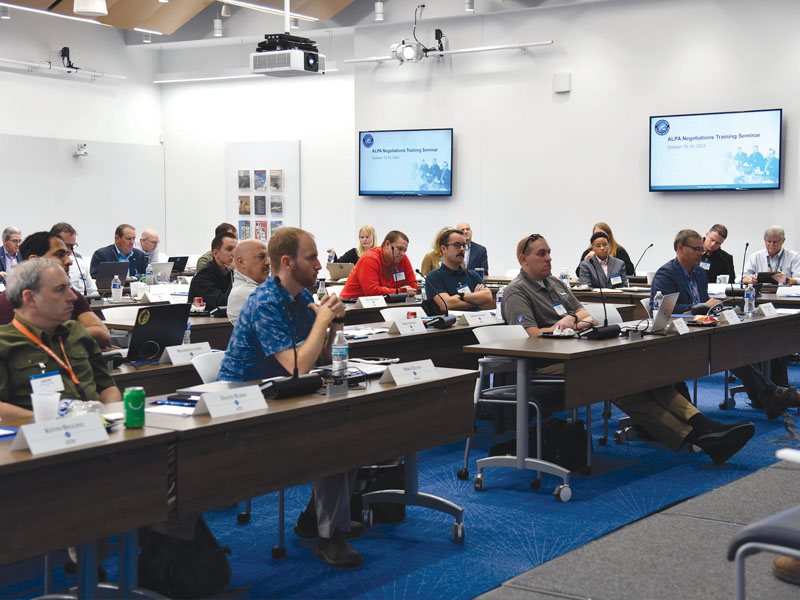Negotiations Training Seminar Emphasizes Planning and Communication as Keys to Success
By Kevin Cuddihy, Contributing Writer

ALPA negotiators listen to a panel describing the Association’s team approach to negotiations.
More than 40 pilot volunteers from 17 ALPA pilot groups met on October 10–13 in the Association’s offices in McLean, Va., for an in-depth discussion of one of ALPA’s top priorities: negotiations. The Negotiations Training Seminar included both brand-new volunteers as well as experienced pilot leaders who acted as facilitators and mentors.
Capt. Jason Ambrosi, ALPA’s president, highlighted the importance of their work, thanking the volunteers for stepping up to conduct a “critical function” of the Association. “The work that you do this week,” he continued, “and what you learn from the pilot negotiators who’ll share their own experiences will give you the tools you need to succeed on the job.”
Ambrosi pointed out the number of ALPA’s departments involved in the event, including Communications, Economic & Financial Analysis, Government Affairs, and Legal, in addition to Representation, to showcase the breadth of the seminar.
The seminar included presentations by ALPA pilot leaders as well as staff from the various departments, plus panel discussions on important topics such as strategic planning, bargaining strategy, building unity, decision-making, benefits plans, and more.
To provide attendees with hands-on experience in collaboration, decision-making, and more, they participated in a series of exercises and simulations designed to put them into situations they’ll see as they go through the negotiations process.
These simulations were led by veteran negotiators who provided guidance and answered questions while letting the volunteers learn from the experience.
“As a facilitator, I want to give enough guidance to participants to keep them on track while also allowing them room to make mistakes they’ll learn from,” explained Capt. Doug Grant (Hawaiian), one of the seminar’s facilitators. “Many of the best lessons learned in simulations are from the mistakes that are made.
“My goal,” he continued, “is to share experiences and lessons I’ve gained through past negotiations that participants can learn from and provide guidance about how to approach negotiations, not step-by-step instructions.”
The simulations started with an opening negotiation on purchasing a car that would best fit a group of four roommates with a variety of priorities and ended with an in-depth mock negotiation between “management” and “union,” with each side presented a loose set of musts, wants, and extras. In each successive simulation, the pilots were able to apply what they learned from the various presentations and panels.
Grant noted the progression of the participants’ skills from the first day of the training to the last. “There’s great satisfaction in observing participants’ growth from the first to the last exercise and to see the difference regarding how they approach a problem,” he said.
Throughout the four-day event, presenters repeatedly referenced the importance of two key elements: planning and communication. A pilot group’s strategic plan dictates the path for negotiations, and constant communication—between Master Executive Council (MEC) leaders and the Negotiating Committee, the Negotiating Committee and other MEC committees, and the MEC and the pilot group—is of the utmost importance.
In addition to the need to share and communicate the plan, attendees learned about adapting the plan when outside circumstances dictate, creating a bargaining strategy that fits the plan, and using leverage to assist in the success of the plan.
Jeff Loesel, a manager in the Representation Department and moderator of the event, emphasized the six simple steps to a successful negotiations process:
- Have a plan.
- Communicate to the pilot group about the plan.
- Execute the plan.
- Communicate to the pilot group about how you’re executing the plan.
- Complete the plan.
- Communicate to the pilot group about how you completed the plan.
“I’ve never been at a negotiating table with a strong plan where management succeeded in throwing us off our path,” said Loesel.
“We hope you’ll come out of this seminar with better skills, ideas, and connections with your fellow pilot,” Andrew Shostack, director of ALPA’s Representation Department, told attendees. “This is why ALPA is successful—we help each other.”
With a robust focus on planning and communication; an introduction to the tools, techniques, and strategies used in the negotiations process; and hands-on experience guided by fellow pilots who’ve been at the table, attendees left with a solid foundation to conduct the important work of negotiating on behalf of their pilot groups.

